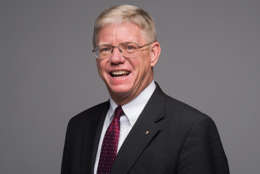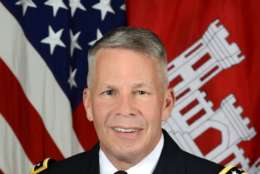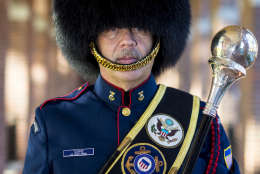Army
-
The 9/11 attacks wrecked a big chunk of New York City infrastructure. Hurricane Sandy washed away parts of New Jersey and New York. For decades, waterways feeding East Coast ports were too shallow. Joseph Seebode, deputy district engineer and the chief of programs and project management at the Army Corps of Engineers, is a finalist in this year's Service to America Medals program. He tells Federal Drive with Tom Temin how he's going to fix all those problems.
May 26, 2017 -
Army says commands have already issued several RFPs under new contract vehicle for cloud services, migration.
April 25, 2017 -
The Army is in the midst of a sweeping review of its intelligence apparatus. Interviews and surveys are asking commanders at every level what they'll need from the intelligence corps over the next decade.
April 20, 2017 -
After years of work inventorying its legacy business information technology systems and building more modern ones to replace them, the Army says it has an aggressive plan in place to cut its number of business IT systems in half.
April 18, 2017 -
This week, Women of Washington interviews Sally Ann Zoll, CEO of United Through Reading, a nonprofit organization that serves military families.
April 12, 2017 -
The Army says it has established a new, streamlined process to approve exemptions from President Donald Trump’s governmentwide hiring freeze, and has now approved about 20,000 new civilian hires, up from just 5,500 waivers the service had issued as of a week ago.
March 15, 2017 -
Of the Army’s buildings, 22 percent now meet the Defense Department’s criteria for “poor” or “failing” condition. The service faces a backlog of $10.8 billion in deferred maintenance projects.
March 09, 2017 -
Lt. Gen. Todd Semonite is on a mission to drive the U.S. Corps of Engineers toward more collaboration and opportunities by taking care of national security, energizing the economy, and reducing disaster risk.
March 07, 2017 -
The Army is required to provide Intel and weather information to soldiers in the field. The military branch opted to solicit for a development contract instead of diving into commercial software to complete the task. What happened next might be surprising, and Joe Petrillo, a procurement attorney with Petrillo and Powell, joined Federal Drive with Tom Temin to provide some context.
February 16, 2017 -
Although the governmentwide hiring freeze President Donald Trump ordered last week was mainly meant to shrink the federal workforce through gradual, voluntary attrition, it could result in an untold number of unexpected dismissals for Defense workers in charge of repairing and "resetting" military equipment.
February 01, 2017 -
Coast Guard Master Chief Jonathan Towne is celebrating his retirement as drum major with one more march down Pennsylvania Avenue. Towne has been marching in inaugural parades with the Coast Guard Band since 1989.
January 18, 2017 -
In today's Top Federal Headlines, the Veterans Affairs Department's Inspector General says the agency needs more oversight of its recruitment, relocation, and retainment incentives.
January 10, 2017 -
Army Secretary Eric Fanning has issued highly detailed orders to three-and-four star generals in the Army's headquarters and functional and geographic commands, telling them precisely what must be done to close 60 percent of the service’s 1,200 data centers by the end of 2018 and 75 percent by 2025.
January 10, 2017 -
The Pentagon said Tuesday that it expects to reach final decisions by July on each of the more than 17,000 cases in which soldiers were paid large bonuses to re-enlist during the heights of the wars in Iraq and Afghanistan only to be told years later that they must give the money back.
January 04, 2017 -
The Army says it’s becoming the first of the military services to launch a digital service “outpost” and wants a dedicated team of technology experts from outside the government to tackle its own problems.
December 19, 2016














